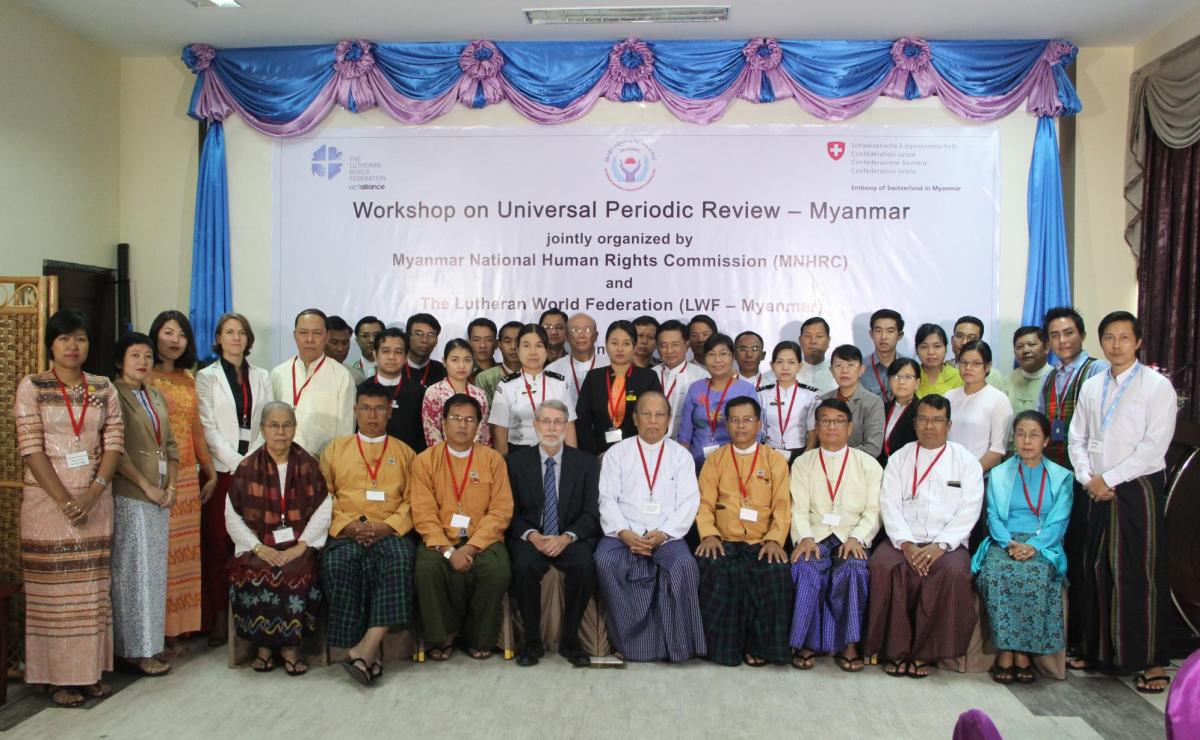ADVANCING HUMAN RIGHTS IN MYANMAR

ADVANCING HUMAN RIGHTS IN MYANMAR, a non-confrontational, conflict sensitive, evidence-based and solution-focused approach
The most important part in the Universal Periodic Review (UPR) process is the Follow-up. In the phase following the announcement of the 166 accepted recommendations of the Government of Myanmar it was important to come together in country as members of civil society, academics and other stakeholders, such as lawyers, religious leaders as well as government departments in order to reshape advocacy plans reflecting the new position of the government in relations to the 166 government commitments.
“It is important to jointly follow-up on these commitments and be in contact with government institutions at different levels in the process of implementation,” - Francesca P Traglia.
In 2016 LWF Myanmar worked to expand the pool of human rights defenders that are regularly engaging at the national and international level with the UN Human Rights Monitoring Mechanisms, as well as in policy dialogue with the government at national level.. Five Myanmar human rights defenders that have been advancing topics on the protection of human rights defenders, religious freedom, women’s rights and land rights in a non-confrontational modus operandi travelled to Geneva to advocate on the advancement of policies required to advance sensitive human rights concerns in Myanmar. It is rewarding to see that these individuals have now broadened their networks and have more confidence to engage more concretely in policy dialogue with the government in Myanmar.
Through 7 seminars and workshops at national, regional and township level LWF Myanmar continues to promote, through its networks, a Non-Confrontational, Conflict Sensitive, Solutions-Focused, Evidence-Based Engagement to all human rights advocacy which follows do no harm principles, allowing for increased numbers of rights holders and duty bearers to engage in dialogue to advance human rights in any country.
Another important achievement this year has been the development of a strategic partnership with the Myanmar National Human Rights Commission (MNHRC). LWF Myanmar and MNHRC held a meeting at Parliament and Ministry level (National Level Workshop in Nay Pyi Taw 9-10 August 2016) in order to concretely discuss steps the government intended to take in order to start implementing the 166 accepted UPR recommendations. (Nay Pyi Taw, August 2016) A concrete commitment from the government to set up an inter-ministerial committee that drafts an Action Plan for the implementation of the recommendations that we, as civil society can use as the roadmap for holding the government accountable for the 166 accepted recommendations was the key outcome from the meeting.
In collaboration with (MNHRC) LWF is raising awareness among duty bearers at village and township level regarding the government commitments to the 166 accepted recommendations, allowing for debates to take place between villagers and Township Medical Offices, Township Authority office, Education department, Relief and Resettlement offices as well as other township level relevant government offices.
This approach has the potential to ensure commitment of government officials to follow-up implementation of recommendations they themselves formulated. It has the potential to achieve real change for the communities recommending focused changes and lastly has the potential to support the development of civil society actors that value the importance of constructive, non-confrontational, conflict sensitive, evidence-based solution focused policy dialogue. For these reasons LWF Myanmar is committed to continue to work with and support likeminded organizations and individuals in order to ensure sustainable advancements in human rights in the country.





